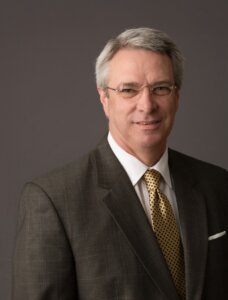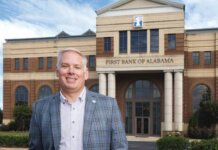
An anniversary is a time for reflection, looking back at what has gone well and what may need changing.
But as ServisFirst Bank marks its 20th year in business, it is staying solidly focused on its original strategies — applying a personalized touch to customer service and employing a decentralized model of operation.
Those factors appear to be working well for ServisFirst, which now has assets exceeding $18 billion. Among other accolades, its high-performance model was recognized on Forbes’ list of America’s Best Banks, ranking 15th in 2023 among the top 100 publicly traded banks based on growth, credit quality and profitability.
A strong client focus was a big impetus for the bank’s founding in Birmingham in May 2005, explains Tom Broughton, chairman, president and CEO. “If you don’t think that existing banks are doing a good job of serving clients, and you think there’s a better way to do it, that’s an opportunity for a new bank.”

ServisFirst targets the business and correspondent banking markets, and also offers private banking, says Rodney Rushing, executive vice president and chief operating officer. “We serve a lot of small businesses, but we don’t have a branch network as we are not a consumer-based banking organization,” he explains.
In March 2011, the firm added correspondent banking to its mix of products as it fit well with ServisFirst’s business banking model, Rushing says. “There was a void in providing services to community banks. That was the exact same void that Tom saw in the mid-market business community,” he notes.
Rushing describes correspondent banking as “a bank for bankers.” Small community banks often have limited resources and need help from a larger bank, he explains. One example — a community bank may have a good customer who needs a loan, but the amount is more than the bank’s legal lending limit.
ServisFirst can provide these banks with credit services, some operational services, wires, international services and credit cards. “Basically, we help them compete with the other banks in their market by being able to provide some of those services,” Rushing explains.
Currently, nearly 390 downstream banks in 30 states have accounts with ServisFirst, according to Rushing. The mix also includes several small community credit unions.
Serving the business community’s banking needs goes beyond the usual tasks of a bank at ServisFirst. For example, a company may request a loan from ServisFirst for an expansion. “[Our answer] may not be a ‘yes,’ [but] we can do it this way,” Broughton explains. That “way” may be to suggest an economic development incentive instead.
“That is the point of having the bank and making it different. We try to add value to our customers instead of just simply being a place for taking deposits and making loans. We try to figure out how we can add value for them and how they can be more efficient,” Broughton says.

Another way that ServisFirst differentiates itself is by using a decentralized model of operation. Twelve regional CEOs across the Southeast manage their own ServisFirst banks, note Rushing and Broughton. “Tom gives a lot of authority to local management. He lets them run their own bank. And he gives them credit authority up to a certain point,” explains Rushing.
Decentralization speeds up loan decision-making and also supports ServisFirst’s personalized customer service.
For example, when a loan above a bank’s credit authority is needed by a business owner, the application goes to the Birmingham office for approval. In a typical bank’s centralized management structure, the approval could take weeks due to a credit committee that only meets periodically, Rushing explains.
But at ServisFirst, the chief credit officer, along with Broughton or Rushing, quickly meet to review the credit request. They make a timely decision and relay this to local bank management, Rushing says. In turn, the local bank quickly informs the customer with whom he’s already built a relationship.
“So, that decentralized model in the Southeast has worked [for ServisFirst] as opposed to a lot of our competitors where a business owner has to call the bank, introduce himself, and try to find out who’s in charge of his account now,” Rushing explains.
In looking back on ServisFirst’s 20-year history, Broughton says that, other than adding correspondent banking, the firm’s original business strategy hasn’t changed.
“We’ve never had a strategic planning meeting for the bank since the bank started 20 years ago,” he notes.
He remembers a strategy-related argument with his father about Southwest Airlines. His father didn’t like the carrier because it didn’t offer assigned seats or a first-class section, which he preferred on longer trips, Broughton says.
“He just didn’t understand [how Southwest operated]. So, I asked him, ‘how many times do you think they’ve been tempted to add first-class seats?’ Well, guess what? They’re finally adding first-class seats. But they kept their business model,” Broughton explains.
ServisFirst runs with this same simplicity at its core. “We haven’t complicated it. We don’t try to be all things to all people,” Broughton says, noting that larger banks tend to frequently add new programs that they believe will improve their banks.
“There really aren’t any magic bullets. The best thing you can do is focus on improving your service to customers and keeping things simple,” Broughton says.
Looking forward, ServisFirst plans to continue adding new markets across the Southeast, according to Broughton. Key to this growth is finding the right bankers who want to join ServisFirst, he says. The firm’s current footprint extends across seven states in the Southeast, with 34 banking locations.
“We continue to grow and scale the bank up, but growth is not the goal,” Broughton says. “Serving customers is a goal, and growth and profitability are byproducts of doing what we should be doing with our time, which is focusing on the customers’ needs,” he notes.
In marketing materials, ServisFirst refers to itself as a “disciplined growth company.” What does that mean exactly? Broughton says it’s about growing organically. “We grow with core deposits [from core customers] — the right way. And it also means that we grow profitably.”
In today’s uncertain economic climate in the United States, it’s natural for banks to get jittery about the future. But ServisFirst, Rushing notes, is maintaining a steady course. “We don’t try to predict whether rates are going up or down. We try to make our margin no matter what happens with rates. We’re not going to do anything any differently. We’re going to be consistent. And that’s what customers want you to be.”
Looking in the 20-year rearview mirror, what is Broughton most proud of at ServisFirst? “The jobs we’ve created for our employees and the service we give our customers,” Broughton answers.
“We’ve tried to be a very great place to work for our employees. Our people probably work a lot harder than most banks, but we’ve seen more success than most banks, and that’s because our employees do an outstanding job. We built something that’s worthwhile, and we’re really proud of it.”
Nancy Randall is a Tuscaloosa-based freelance contributor to Business Alabama.
This article appears in the July 2025 issue of Business Alabama.



